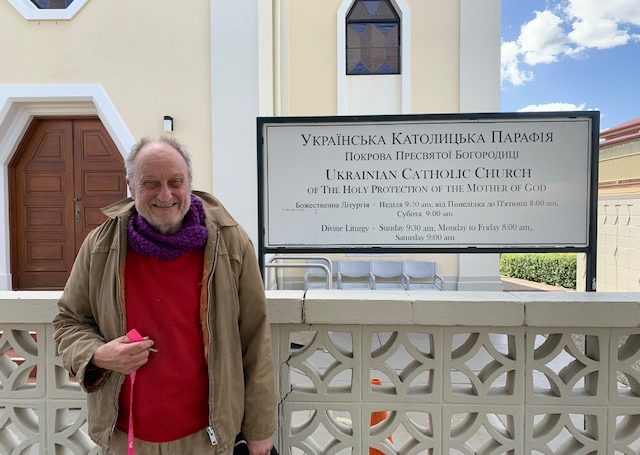“A year ago people called me a pacifist”
Reflections
“A year ago people called me a ‘pacifist’ and I often thought that the profession of arms was unworthy of a Christian. Many of my friends are principled pacifists who say that any kind of violent harm, even in self-defence, is morally wrong. Since the Russian Federation’s all-out invasion of Ukraine in February last year, I’ve changed,” says Fr Martin Arnold, a Churchie Old Boy and Ukrainian Catholic priest

Please be aware that this content may be very distressing for some readers.
A year ago people called me a “pacifist” and I often thought that the profession of arms was unworthy of a Christian. Many of my friends are principled pacifists who say that any kind of violent harm, even in self-defence, is morally wrong. Since the Russian Federation’s all-out invasion of Ukraine in February last year, I’ve changed.
First, I now consider that soldiers can be good, honourable and disciplined.
And second, I now believe that the study of war is essential for soldiers. And if you serve in the armed forces you need to study diligently so as to make war with minimal harm to both your own side and to the enemy’s.
People who have studied war, such as the recently retired head of the Australian Defence College, Major General Mick Ryan, judge that the Ukrainian forces have largely learnt how to fight in an honourable and disciplined way.
And they judge that the commanders of the Russian Federation have often been reckless and unwilling to learn from experience, and that their troops have often been inhumane and undisciplined.
I still commend my pacifist friends and admire their principled views.
But I also think that those who directly resist a brutal, murderous horde are doing good.
A turning point in my thinking came when I read about the Bucha massacre. Bucha is a pleasant town north-west of Kyiv – about as far from Kyiv as Ipswich is from Brisbane. The invaders came as close to Kyiv as Bucha, but then withdrew.
Advertisement
After their March withdrawal, the bodies of more than 400 civilian corpses were uncovered.
I read online that many had been summarily executed. A number of Ukrainians had been tortured. Many women and children were raped – I read about mothers being raped and killed in front of their children and even of a boy being raped in front of his mother. Children were among the dead.
I also read of an unarmed cyclist being shot and killed. And of people being executed because they bore a trident tattoo – the trident is a symbol of the Ukrainian state.
Following the massacre, international war crimes experts arrived to document the atrocities.
Demoralised and undisciplined soldiers will do appalling things. But General Ryan is not alone in judging that the depravity and scale of the atrocities indicate a policy of deliberate cruelty of some Russian Federation forces units.
After reading about the atrocities committed in Bucha, it became impossible for me to think of suggesting to Ukrainians at home, “You should consider ceding territory to the Russian Federation.”
Advertisement
How can the Ukrainian government or others willingly consider ceding any territory to an invading power that allows such cruelties as a matter of policy?
Ukrainians are grateful for moral support from abroad. Archbishop Welby, Pope Francis and Patriarch Bartholomew continue to call for peace and the cessation of the invasion.
But I condemn the pernicious teaching of the Moscow Patriarch Kirill that the death of a soldier fighting for the Russian Federation is a “sacrifice” that “cleanses all the sins that a person has committed.”
The Finnish Prime Minister Sanna Marin has given the simplest and most practical answer to a journalist’s question about “a way out of the conflict.”
Ms Marin replied: “The way out of the conflict is for Russia to leave Ukraine. That’s the way out of the conflict.”
I ask anglican focus readers to pray that the Russian Federation forces leave Ukraine and that the Russian Federation makes reparation for the damage that it has caused.





